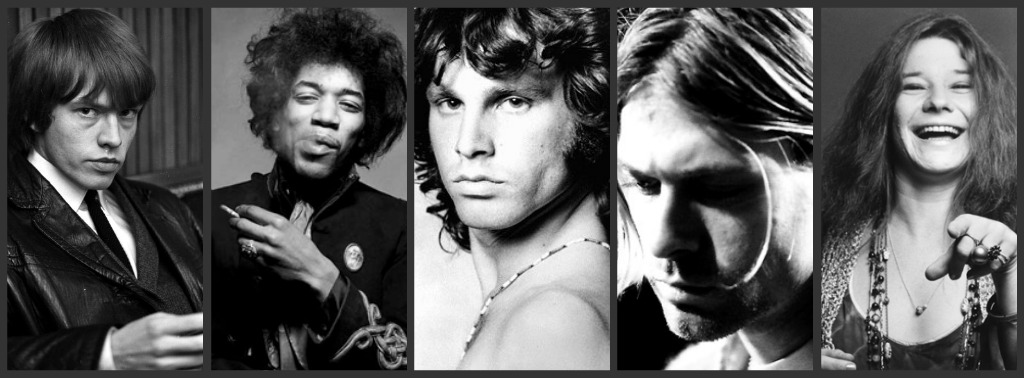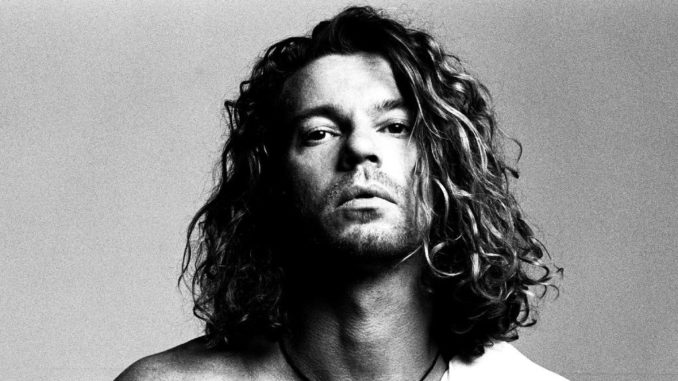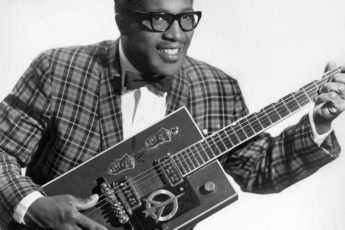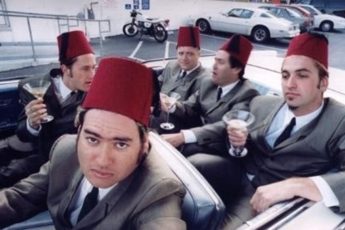There’s no worse club to belong to in rock lore than the “27 Club.” Membership denotes the tragic end of a musician’s life at the incipient age of 27 cruelly shared by so many. The five most famous representatives, of course, are Jimi Hendrix, Janis Joplin, Jim Morrison and Rolling Stones founder Brian Jones – all, incredibly, within exactly 2 years of each other at the turn of the turbulent ’60’s/‘70’s – plus Kurt Cobain, whose shotgun suicide in 1994 marked the culmination of a very different era. Less widely remembered, though, are numerous other music luminaries whose lives, amazingly, were also finished at the same brutal age of 27: neo-soul chanteuse Amy Winehouse, Pete Ham of Badfinger, Grateful Dead keyboardist Ron “Pigpen” McKernan, Alan “Blind Owl” Wilson of Canned Heat, punk paragon D. Boon, and the original bluesman Robert Johnson, whose crossroads deal with the devil ended in 1938.
Michael Hutchence made it a decade longer. The phenomenally talented and charismatic singer of INXS (an ultimately ironic phonetic play on “in excess”) led one of the most successful bands of the ‘80’s and ’90’s until he was found dead in a Sydney hotel room at age 37 in what was ruled a suicide by hanging. Blockbuster hit songs like ‘Original Sin,’ ‘What You Need,’ ‘New Sensation,’ ‘Never Tear Us Apart,’ ‘Suicide Blonde’ and ‘Need You Tonight’ blended new wave and alt-rock with Hutchence’s magnetic serpentine presence to become ubiquitous on rock radio, MTV, and in dance clubs. And notably, many of their tunes, as primarily written by Hutchence, contained a depth beyond what would be initially most appreciable in their funky, rhythmic beats.
Not long ago I heard another more-than-it-seems INXS gem, ‘Don’t Change,’ as it played over the end credits of 2009 movie Adventureland, a sleeper coming-of-age dramedy starring Jessie Eisenberg, Kristen Stewart and Ryan Reynolds (in addition to scene-stealing moments for Bill Hader, Kristen Wiig, and Martin Starr) that’s gotten better with every viewing (quite a few times recently). The soundtrack, too, is absolutely teeming (41 songs were licensed for the film) with what might best be described as high-end ‘80’s indie rock: The Replacements, Hüsker Dü, Big Star, Crowded House, Yo La Tengo, as well as a central plot point involving Lou Reed. The protagonist, Eisenberg, is a recent graduate of Oberlin College (where he majored in Comparative Literature and Renaissance Studies) who goes through some emotional turmoil and bitter soul-searching working a menial summer job at the titular western Pennsylvania amusement park. But in the end he finds peace of mind, and possibly even future happiness, upon being reunited with Stewart in rainy New York City. In keeping with the surging INXS jam with which his story arc concludes – and notwithstanding its apparent contrarian title – he had, most certainly, changed.
Still another memorably haunting INXS tune contained the following repeated intonation:
“Devil inside / The devil inside / Every single one of us (has) the devil inside”
In some part what led to the disastrous destinies for the tragic members of the 27 Club – as well as Hutchence as the one representative for 37 – must have been the inability to sufficiently distract that demon. The music world, and the world at large, is a far poorer place because these brilliant artists would not or could not change the trajectory they were on. “Don’t change” was the commendable edict of the song, but it must also be said that sometimes change is a good thing.
And if, by chance, you still recall INXS as merely lightweight synth-pop, check out who covered our featured song during a 2014 concert appearance in the band’s hometown of Sydney, Australia.








Rob MacMahon
June 25, 2023 8:47 pmBG: INXS played a huge role in my college, and consequently, college radio days. Their albums, with the exception of Kick, could be inconsistent. However, they had a string of awesome singles incl Don’t Change, Original Sin, The One Thing, I Send a Message, What You Need, Listen Like Thieves, This Time, Need You Tonight, Devil Inside, Never Tear Us Apart, Suicide Blonde, etc
All were great and also the one thing that set them apart from some of their peers was the absolute “dance-ability” of their songs. Always packed the frat dance floor.
And Michael Hutchence convincingly defeats the Quentin Tarantino dictum that straight guys shd never dance with their arms above their head…For proof, watch the video for This Time. That cat’s leonine moves put Jagger to shame.
Music is Life, my friend! RMac